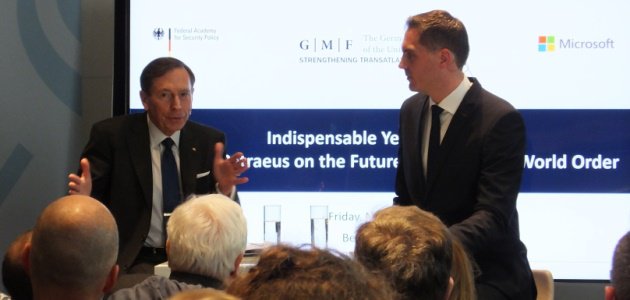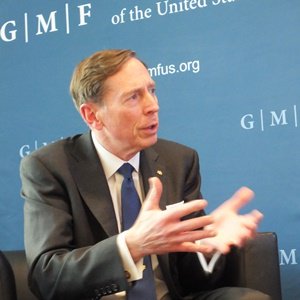In early March, the Federal Academy for Security Policy hosted a discussion event with General (ret.) David Petraeus in cooperation with the German Marshall Fund of the United States and Microsoft Berlin. Petraeus shared his views on the future of the liberal world order and US security policy under the Trump administration.

"Indispensable, yet still at risk": Former Director of the CIA, General (ret.) David Petraeus made the case for a rule-based liberal world order. The discussion was moderated by German CNN correspondent Frederik Pleitgen (right). Picture: GMF
“Ladies and Gentleman, we are currently facing transatlantic trouble”, introduced D. Karl-Heinz Kamp the audience at the Microsoft Berlin Office. The President of the Federal Academy for Security Policy said that he asked himself whether the United States were truly united or rather divided at the moment. Hence questions arise with regard to the future of transatlantic relations. Europeans, Kamp emphasized, currently asked themselves who is speaking for whom in the Trump administration. Hence General Petraeus’ insights were also welcomed to shed some light into the European knowledge darkness.
Preserve, but also adjust the liberal world order
Petraeus said that even though President Trump’s policy was driven by the slogan ‘America First’, he had to act pragmatically. Without doubt, other states put their own national interests above others, too. However, according to Petraeus there could be mutual benefits for all parties involved: “International relations are not zero-sum, after all.” He concluded that a rule-based global order facilitated shared benefits and therefore must be maintained: “The United States has prospered in this rule-based system, to be sure. However, we’ve also accommodated the rise and decline, of other powers.”

He added that various institutions, organizations, and norms served the world well in creating a rule-based global order. However, the aspirations of future powers such as China and India needed to be taken into account when adjusting the current order. “This type of system can enable them to achieve what they seek as, indeed, it allows others also to achieve what they seek”, Petraeus said. With regard to Europe, Petraeus emphasized the importance of burden-sharing among NATO members. He appealed to the German Federal Government to push for more awareness for this among the population.
David Petraeus is one of the most prominent military service members in the US. He served as Commander of the coalition forces in Iraq and later of the ISAF Forces in Afghanistan. Having retired from military service he became Director of the Central Intelligence Agency until his resignation in November 2012. By the time the Trump cabinet was established, Petraeus has been frequently mentioned as a candidate for the future US National Security Advisor.
Author: Katharina Pachmayr
